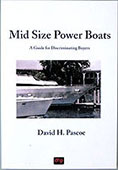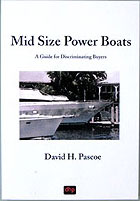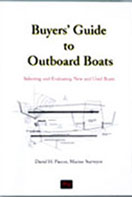Affordable Boats
by David Pascoe
The lighthouse is a navigation aid that may warn the sailor off a dangerous reef, or guide him to safe harbor. Without a chart, and the ability to read it, the sailor knows not which it is.
"The last I heard, the sea is still the sea." -- Rudyard Kipling
Despite the fact that we have posted on our front page the notice stating that we don't answer questions on what kind of boat to buy, every week we still get numerous requests. Perhaps the most surprising thing is what these letters tell us about how little so many boat buyers know about boats.
A typical example is one where the writer lists a number of boats he's considering, asking which on the list is the better quality boat. The list may look something like this: Bayliner, Silverton, Luhrs, Egg Harbor, all of the early 1980's vintage. Obviously, one of these is the odd man out, but the inquirer isn't sufficiently informed to know the difference. He's not even aware of the reputations, let alone any facts.
About all we can say is that if you know so little about boats that you can't distinguish good quality from poor quality, you probably shouldn't be buying a boat. Its really that simple. There are over 60 essays on this web site to help educate you, but apparently you either haven't read them, or if you did, you were reading without comprehension.
The bottom line is, if you know so little about boats, but are determined to buy one -- especially a larger one -- then you are either going to educate yourself, or you are going to learn the hard way. Yet learning the hard way is hardly the practical way when you propose to spend fifty or a hundred thousand dollars or so.
These letters also tell us a lot about the nature of "consumerism" (that wonderful word) these days. But it is an "ism" simply by virtue of the fact that consumers apply a certain philosophy with respect to things they purchase. To wit, they demand the right to be able to go out and buy a very expensive product without discernment, apparently feeling that the rule of caveat emptor has been repealed. It hasn't, but modern mass production has simply made it too costly for major manufacturers to make big mistakes these days. In modern manufacturing, production runs typically run in the millions of units, and to make a mistake could be disastrous.
Thus, the modern manufacturer's motive is less to turn out defect-free products over concern for quality, but rather is motivated by the fear of the cost of defective production runs. This has lead to a situation in which consumers have come to expect all products to be defect-free. It has also lead to consumers making large purchases without discernment as to quality, simply because they are conditioned to expect it to be right. And when small products are defective, its a simple matter to return it for an exchange or refund. Try doing that with a boat and you're in for an unpleasant surprise. Boat builders are not only reluctant to exchange a defective product, many of them are reluctant to even make good on repairs.
Unfortunately, it is not possible to apply this "ism" to boats. Boats are NOT mass produced; they are hand made items. They're not cranked out by a computer programmed machine that's going to turn out the same identical parts every time. No, no, no! They're made by human beings who are turning out consistently DIFFERENT quality parts every time. Ergo, boat quality is only as good as the builders dedication to quality, or dedication to fast profit. Even Hatteras and Viking have turned out some real clunkers.
Let me tell you about the days when the aerospace company, North American Rockwell, owned Hatteras in the 1970's.. They couldn't even wire a 12 volt system right. But what did NAR know about boat building? Nothing.
Of course, when it comes to used boats, there's nothing to fall back on at all. You either get it right the first time, or you're out of luck. What you don't know about, and will never hear about, are the thousands of people who buy junk boats, send tens of thousands of dollars down the drain, and have no choice but to pass their problems on to some other unsuspecting fool. The reason is that not many people are willing to admit to making big mistakes. Show me a guy who is nearly bankrupted by his crummy boat, and I'll show you a guy who runs around telling everyone how wonderful it is. There's a lot of ego involved here.
True, judging the quality of boats is not easy, nor is the acquisition of the knowledge that facilitates that ability. But its your choice. You have no right buy a boat and expect it to be free of major defects. None at all. You say the law gives you that right? So what! Boat builders come and go with amazing frequency, a turn over rate in excess of 50% every ten years. If you want to rely on consumer laws, just think about trying to sue a bankrupt company. Not much help, is it? Even Bertram, Blackfin and Egg Harbor have gone belly up. Got a warranty claim? Sorry, Charley . . . . .
If you believe that large boats should be "affordable," then you are a victim of consumerism. Yachting is the rich mans sport. The industry has changed the name to "recreational boating" in order to increase the market. But good quality boats are not affordable, and never will be. If you're going to buy an affordable boat, you might as well buy an affordable airplane too. And cross your fingers.
We have endeavored to provide you with just about everything you need to know to make an informed purchase decision on this web site. But its up to you to educate yourself and learn how to discern what constitutes good quality. And if you don't want to do that, you can always hire a good surveyor as a consultant to do this leg work for you. But if you're the sort who thinks he can take a short-cut by shooting an e-mail off into cyberspace and get all the right answers, you're sadly mistaken. There are no short-cuts to self-knowledge. Wisdom always comes at a price, whether you pay for it, or acquire it yourself.
Life is a beach. But they don't mention what its like stepping on a Portuguese man-o-war or getting a sunburn. Both sting.
And there is no such thing as an affordable boat.

















David Pascoe is a second generation marine surveyor in his family who began his surveying career at age 16 as an apprentice in 1965 as the era of wooden boats was drawing to a close.
Certified by the National Association of Marine Surveyors in 1972, he has conducted over 5,000 pre purchase surveys in addition to having conducted hundreds of boating accident investigations, including fires, sinkings, hull failures and machinery failure analysis.
Over forty years of knowledge and experience are brought to bear in following books. David Pascoe is the author of:
In addition to readers in the United States, boaters and boat industry professionals worldwide from nearly 80 countries have purchased David Pascoe's books, since introduction of his first book in 2001.
In 2012, David Pascoe has retired from marine surveying business at age 65.
On November 23rd, 2018, David Pascoe has passed away at age 71.
Biography - Long version